Machine learning helps detect precursor phenomena of earthquakes: A new lab-study provides encouraging results for “time to quake” prediction.
Hydraulic stimulation in hot rock - Unique conditions for real-time monitoring of experiment at a depth of four kilometers
Genetic methods provide important basis for decoding the evolutionary history of life on Earth
Two of the highest EU research awards for the GFZ: With ERC-Synergy Grants, Thomas Walter (r.) will research internal “rotting” of volcanoes & Jens Kallmeyer (l.) metabolism of primordial microbes.
First analyses of satellite and GEOFON data give insights into the processes around the Herat fault, a region that is considered to be seismically rather inactive.
Prof. Friedhelm von Blanckenburg was given a ceremonial farewell into GFZ retirement with a colloquium. Prof. Dirk Scherler (interim) will take over the leadership of the section 3.3.
Marie Bonitz, research associate in section 3.4 Fluid System Modelling, was awarded the poster prize (1st place) at this year's GeoBerlin.
Ebuka Canisius Nwosu was awarded the Friedrich Robert Helmert Prize of the GFZ Friends for the best doctoral thesis of the year 2022/23 for his doctorate in Section 3.7 “Geomicrobiology”.
The GFZ mourns the death of Dr. Rudolf Stecher at the age of 86. He was head of the section Geoscientific Equipment Technology until his retirement in 2002.
The new issue of the GFZ journal "System Earth" shows some of the important contributions of the geosciences to the topic of water.



![[Translate to English:] In the background: The drilling tower made of metal struts. Next to it, crane equipment. In the foreground, pipe rods.](/fileadmin/_processed_/5/c/csm_20231102_Pipehandler-2_GFZ_21ff80c7f9.jpeg)
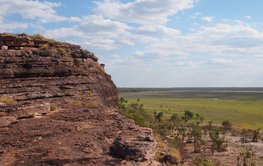
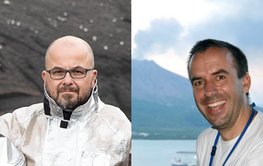
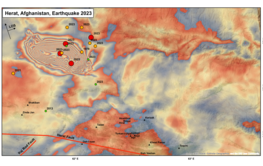
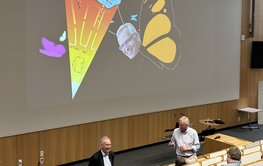
![[Translate to English:] Picture of Marie Bonitz in front of a dry forrest.](/fileadmin/_processed_/5/1/csm_20231005_Posterpreis-Geo-Berlin_c7594954de.jpeg)
![[Translate to English:] Three people are standing on a staircase in front of a yellow house: on the right, the award winner with a bouquet of flowers in his hand. He is being presented with the certificate.](/fileadmin/_processed_/4/d/csm_20230921-kachel_Helmert-Preis_UD_f53334f45d.jpeg)
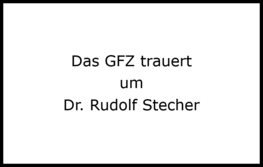
![[Translate to English:] Cover of the new issue of System Earth; above GFZ logo and title "System Erde" in blue, below "GFZ-Journal" in black; below image of light blue river flowing through a stony landscape, text: "Resource, Regulator, Risk: Water in System Earth".](/fileadmin/_processed_/8/5/csm_System_Erde_Ausgabe_1_2023_4e7120bc44.png)